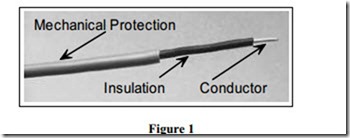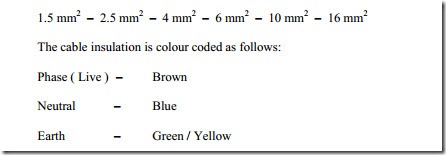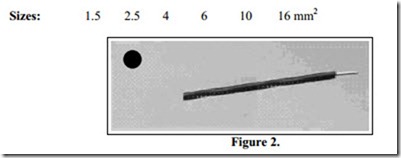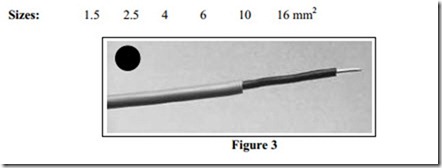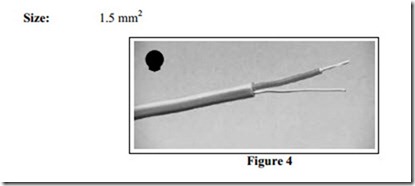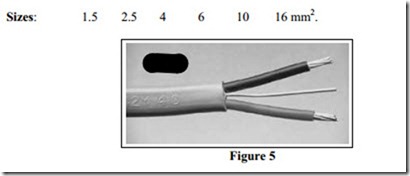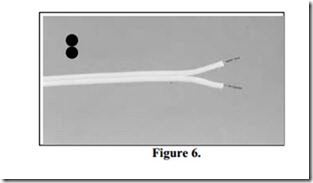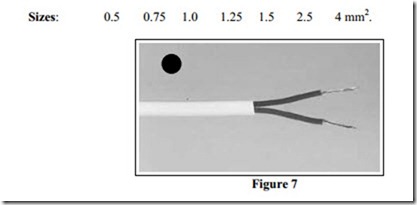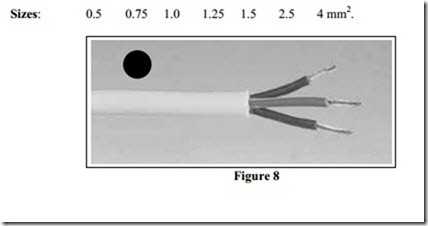Cables and Flexible Cords
Cable Definition
One or more conductors provided with insulation. The insulated conductor (s) may be provided with an overall covering to give mechanical protection.
Construction: A cable consists of three parts. See Figure 1:
1. Conductor
2. Insulation
3. Sheath ( Mechanical Protection )
The most common conductor material used is copper. Aluminium is used for larger cables and its use is not permitted in domestic installations.
The most common insulation used is PVC. Other materials are used as insulation depending on what the cable is being used for and where it is being installed.
The most common mechanical protection used is PVC. Further protection is provided by installing cables in locations where they are unlikely to be damaged. Where this is not possible, cables must be installed in conduit, trunking or ducting. Otherwise a suitably armoured cable must be used. When cables are installed in conduit or trunking they need not have any other form of mechanical protection. The conduit or trunking is deemed to be its mechanical protection.
Cables are manufactured in a range of common sizes. These are decided by the Cross Sectional Area ( CSA ) of the conductor, which is specified in square milli-metres ( mm2 ).
The following is a list of the standard sizes used in domestic installations.
Cross Sectional Area
Cross sectional area is the surface area of a section of conductor.
In the cable most commonly used for domestic installations, there is a bare earth conductor and this must be terminated using Green / Yellow sleeving.
Cables are manufactured with solid, stranded or flexible cores.
Solid cores are used for the small cable sizes where the wiring is fixed.
Stranded cores are used for the larger cable sizes and where more flexibility is required, e.g. where cables are installed in conduit or trunking systems.
The number of strands is normally 7, 19 or 27 per core.
Flexible cores are used where extra flexibility is required,
e.g. pendants, immersion heaters and also leads for portable and hand held equipment. The number of strands is normally 16, 24, 32, 36, 40 or 50 per core.
These flexible cores when used as leads for portable and hand held equipment must be provided with an overall covering for mechanical protection. This unit is referred to as a flexible cord.
Flexible Cord Definition
Single Core Circular Cables
PVC Insulated – Unsheathed
Solid or stranded copper conductor with PVC insulation.
e.g. 1.5 mm2 PVC Brown. See Figure 2.
APPLICATIONS: Installations where drawn into conduit or trunking.
PVC Insulated – PVC Sheathed
Solid or stranded copper conductor with PVC insulation surrounded by a PVC sheath.
e.g. 1.5 mm2 PVC / PVC Blue. See Figure 3.
APPLICATIONS: Used in domestic installations and for clipping on the surface where little risk of mechanical damage exists.
Single Core Cables
PVC Insulated – PVC Sheathed with Circuit Protective Conductor
Solid or stranded copper conductor with PVC insulation surrounded by a PVC sheath.
e.g. 1.5 mm2 PVC / PVC Brown and Earth. See Figure 4.
Applications: Used for lighting circuits in domestic installations and for clipping on the surface where little risk of mechanical damage exists.
Multicore Flat Cables
Twin-Core with Circuit Protective Conductor PVC Insulated PVC Sheathed
Two copper conductors, PVC insulated, laid parallel and surrounded by PVC sheath to give a flat finish. An uninsulated protective conductor is laid in the centre.
e.g. 1.5 mm2 Twin Brown / Blue and Earth. See Figure 5.
APPLICATIONS: As for single core PVC / PVC, especially suited to three-plate ceiling rose method of wiring. Also used for wiring socket outlets etc.
BELL WIRE – PVC INSULATED
Twin core, solid conductors, with PVC insulation. See Figure 6.
APPLICATIONS: Bell and indicator systems. ( Suitable for up to 50 Volts. )
Round Flexible Cords
PVC Insulated PVC Sheathed
PVC insulated flexible copper conductor with PVC sheath forming a round cord. Available in two, three, four and five cores.
e.g. 2 x 0.75 mm2, PVC circular flex. See Figure 7.
APPLICATIONS: General-purpose flexible cord for pendants, portable tools and appliances. Should not be used where sheath can come into contact with hot surfaces.
Heat Resistant – PVC Insulated PVC Sheathed
The insulation and sheathing is made from heat resistant PVC and is available in two, three and four cores, e.g. 3 x 1.5 mm2, heat resistant flex. See Figure 8.
APPLICATIONS: Suitable for use in temperatures up to 85oC. e.g. immersion heaters.
